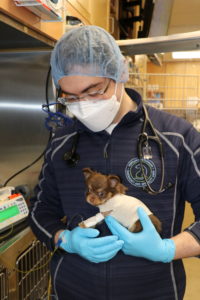Patent Ductus Arteriosus
What is PDA?
PDA is a congenital heart defect in which there is an irregular transmission of blood between two of the major arteries in the heart. In the normal fetus, the blood bypasses the lungs through the “ductus arteriosus” because the lungs are not active and do not oxygenate the blood. When most puppies or kittens are born, the ductus arteriosus closes. This usually happens a few hours after the animal takes their first breath. A “patent” ductus arteriosus (PDA) means that this vessel remains open and blood gets re-circulated through the heart, making the heart work overtime and eventually leading to heart failure. In patients with PDA, the ductus arteriosus remains open, resulting in serious, life-threatening changes in the way that the heart pumps blood through the heart and to the rest of the body. If left untreated, PDA can lead to heart failure.

Myrtle came to PVESC when she was 4 weeks old, (and weighing 1.2 pounds!), after being diagnosed with a heart murmur. After initially being the largest puppy in her litter, Myrtle fell behind in her growth and developed labored, raspy breathing. She was examined by our cardiologist, Dr. MacGregor, who performed echocardiography and diagnosed Myrtle with heart failure secondary to Patent ductus arteriosus (also called PDA). In very small patients, the only option for the treatment of a PDA is surgery. After stabilization through our emergency and critical care service, Myrtle was transferred to our surgeon, Dr. Bush. Through an incision between the ribs, the PDA was identified, gently isolated and dissected, and closed using a permanent suture. Myrtle did great with anesthesia and surgery, and was discharged 2 days later. At her recheck appointment 2 weeks later, she was doing great, gaining weight, and back to being a crazy puppy!
